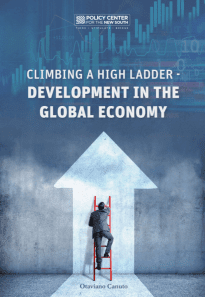
Economic development analysis must inevitably rely on a double methodological standpoint. On the one hand, it needs to search for common features, those general attributes that might be present in all national experiences of wealth accumulation, poverty reduction, and moving up the income ladder. On the other, in order to be meaningful, it must reckon with time and space. It must consider that those universal development traits will play out in specific historical and geographical circumstances that will condition their unfolding. In this book, we try to follow that dual approach. Although each chapter is written in a way that makes it readable as a standalone piece, there is a tentative common thread: We attempt to understand what has meant to climb the income ladder in the context of the global economy prior to and after the 2007-08 global financial crisis. The overall message of our dual analytical-and-historic approach is single: Historic and geographical conditions matter, but ultimately the adoption of appropriate country-specific policies and reforms is what makes the difference.
Get daily updates from Brookings


